Industrial License in Saudi Arabia 2026: The Encyclopedic Guide to Productive Sovereignty and Manufacturing Empowerment
In 2026, obtaining an Industrial License in Saudi Arabia represents the fundamental pillar for establishing the productive foundations of entities amidst the largest manufacturing renaissance in the region. Possessing an industrial permit is no longer merely a legal procedure; it has become a Formulating of the investment identity linking the factory to all sovereign incentives under the umbrella of Vision 2030. At Motaded, we believe that mastering the tools of the Investment Systems in Saudi Arabia and the industrial ecosystem is what grants an establishment operational sovereignty. The 2026 industrial environment provides solutions supporting Freedom of Ownership in Saudi Arabia 100% Foreign Ownership, consolidating the prestige of investment in the advanced manufacturing sector.
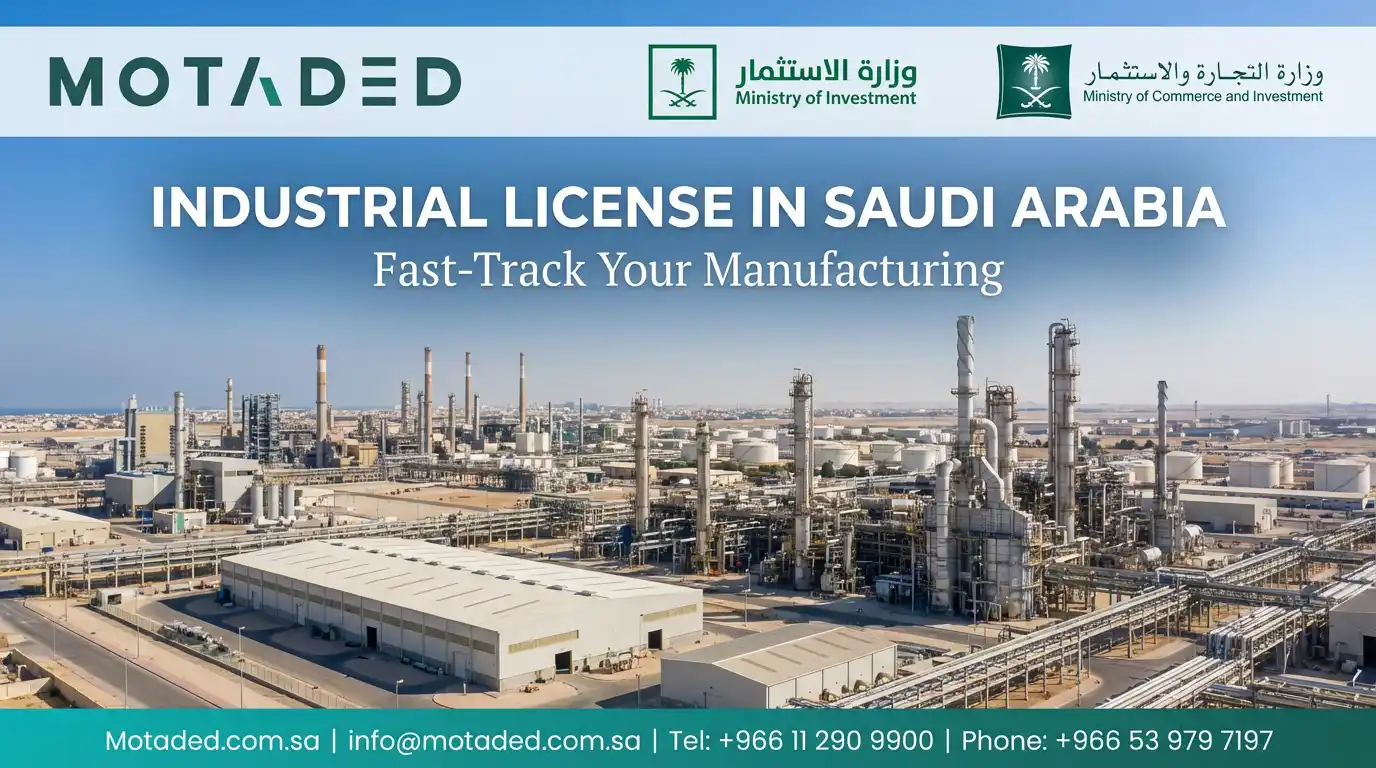
1. The Operational Philosophy of the Saudi Industrial Sector 2026
The philosophy of industrial licensing in 2026 is based on the principle of "Sovereign Sustainability and Innovation," where modern manufacturing technologies (Industry 4.0) have been integrated with regulatory systems to form a leading productive ecosystem. As a primary Consulting Firm in Saudi Arabia for Investors, we observe that this evolution has established the rules of informational integrity in national supply chains. The 2026 industrial policies aim to enhance local content and ensure that Saudi products reach global markets with absolute integrity.
Industrial sovereignty in 2026 mandates establishments to activate their licenses via the "Senaei" platform to ensure procedural connectivity with the Ministry of Industry and Mineral Resources and environmental authorities. At Motaded, we guide our clients to exploit this system to protect their productive assets from operational risks and grant them procedural prestige before international regulatory bodies, consolidating their position as organized manufacturing entities committed to the highest global quality standards of 2026.
2. Digital Harvest: Manufacturing Solvency and Growth Statistics 2026
To ensure absolute informational integrity, the following table documents the efficiency of the Saudi industrial sector for 2026 according to Ministry of Industry and General Authority for Statistics data:
| Industrial Performance Indicator 2026 | Achieved Value (or Number) | Annual Growth Rate | Documenting Authority |
|---|---|---|---|
| Total Licensed Factories | +12,500 Factories | 14.2% | Ministry of Industry |
| Industrial Investment Volume | +1.6 Trillion SAR | Economic Sovereignty | Ministry of Investment |
| Initial License Issuance Speed | 24 Working Hours | Global Procedural Leadership | Saudi Business Center |
| Local Content Rate in Industry | 42.5% | Strategic Growth | Local Content Authority |
These metrics reflect the regulatory solvency enjoyed by the Saudi industrial system, providing a secure environment for international investors to build their productive projects effectively.
3. Licensing Tiers and Procedural Sovereignty for the Establishment
Industrial licenses in 2026 are divided into three sovereign tiers that ensure the proper progression of the project. It begins with the "Planning License," granting the entity the right to start technical studies and land allocation, followed by the "Construction License," allowing for equipment procurement and building, leading to the final "Operational License." At Motaded, we Formulate guidance pathways for our clients to ensure their timelines match the requirements of MODON, protecting the project from procedural delays.
Compliance with each tier in 2026 requires precision in submitting technical and environmental reports. Informational integrity in this sector grants the facility the advantage of obtaining customs exemptions for equipment and raw materials immediately upon issuance of the construction license. We assist companies in building strong technical files reflecting their productive capacity, consolidating the factory's prestige in the Saudi industrial ecosystem and achieving sustainability in managing billion-dollar Cash Flows in Saudi Arabia.
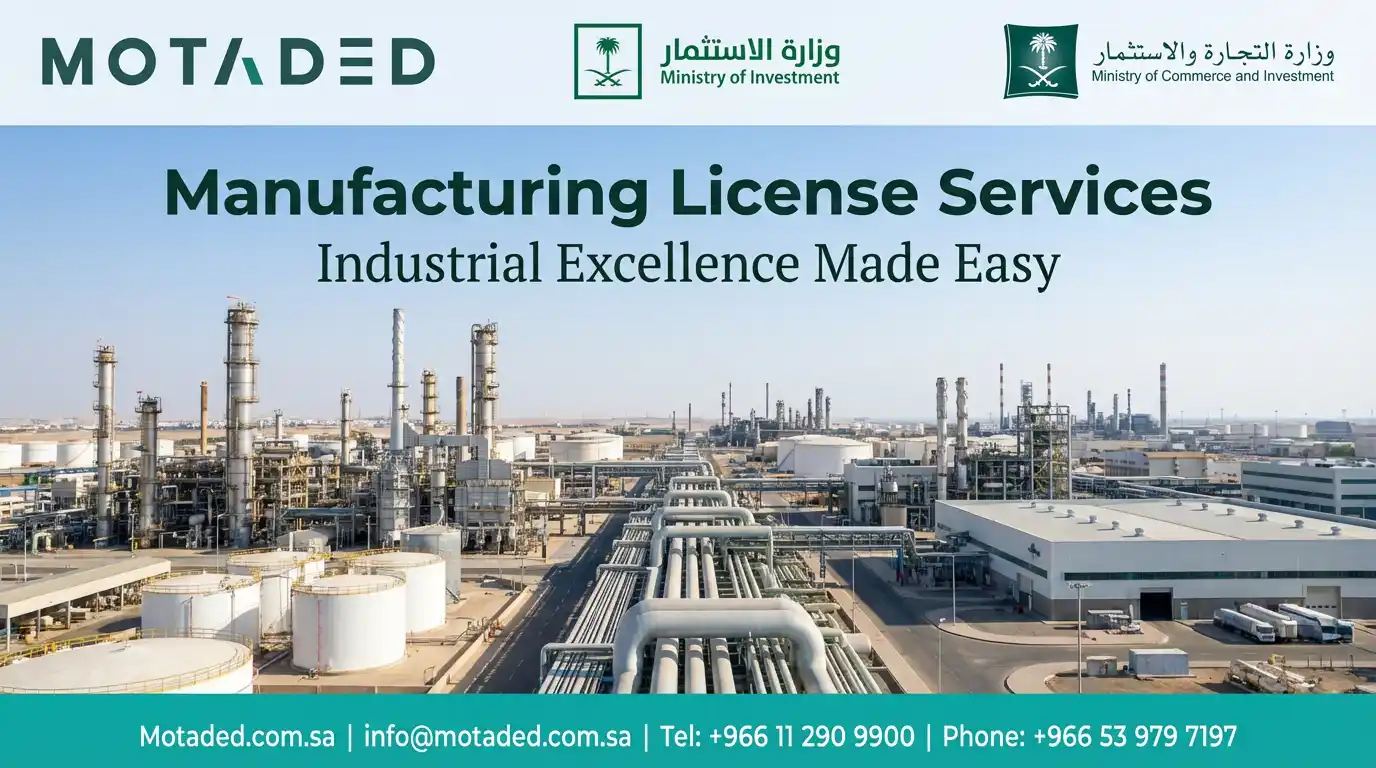
4. Governance of Linking with "MODON" and "Royal Commission" and Spatial Sovereignty
Choosing an industrial site in 2026 represents the backbone of an establishment's stability, linking the industrial license to land allocation in Industrial Cities in Saudi Arabia. Spatial sovereignty mandates that the factory be within a geographical scope supporting logistical supply chains. At Motaded, we assist investors in understanding the Steps for Business Setup in KSA, which begin with selecting the most suitable industrial city for the activity type (light, medium, heavy).
Integrity in using industrial land is what prevents the establishment from violations regarding activity changes or environmental waste. In 2026, an automated link exists between the operational license and the ZATCA system to ensure tax exemptions apply to locally manufactured exports. We ensure our clients' production sites are linked according to logistical sovereignty requirements, granting them priority in reaching ports and logistical zones, consolidating the facility's trade sovereignty against global challenges.
5. Industrial Licensing for Foreign Investors and Credit Sovereignty 2026
The Ministry of Investment in 2026 imposes precise standards for Establishing a Company in Saudi Arabia with full foreign ownership in the industrial sector, requiring a clear technology transfer plan. Credit sovereignty mandates verifying the investor's financial solvency to ensure production sustainability. At Motaded, we provide strategic consultations for obtaining a MISA License Saudi Arabia, ensuring compliance with capital conditions and technical accreditation for the General Manager.
Participating in the Saudi industrial system requires high informational integrity in presenting the "Technical Feasibility Study." In 2026, the state grants billion-dollar financing loans via the Saudi Industrial Development Fund (SIDF) to entities with active operational licenses. We assist companies in building strong credit files reflecting their manufacturing efficiency. Sovereignty in industrial license management lies in building absolute trust with development funds, ensuring billion-dollar liquidity flows to the investor in 2026.
6. Governance of "Local Content" and its Impact on Industrial License Strength
Local content in 2026 has become a core pillar for the completion of an establishment's productive sovereignty. Procedural sovereignty requires factories to prefer local suppliers to ensure priority in billion-dollar government procurement. At Motaded, we Formulate local content plans to protect access to sovereign contracts linked to national products.
In 2026, the link between the operational license and the Local Content Authority grants investors the "Mandatory List" advantage. Excellence in this path requires recruiting Professional Staff in Saudi Arabia specialized in calculating local added value. We provide technical support to assist establishments in updating their production data immediately. Sovereignty lies in the ability to protect the investor's market share and prevent any unfair competition from imported products that have a compliant local alternative for 2026.
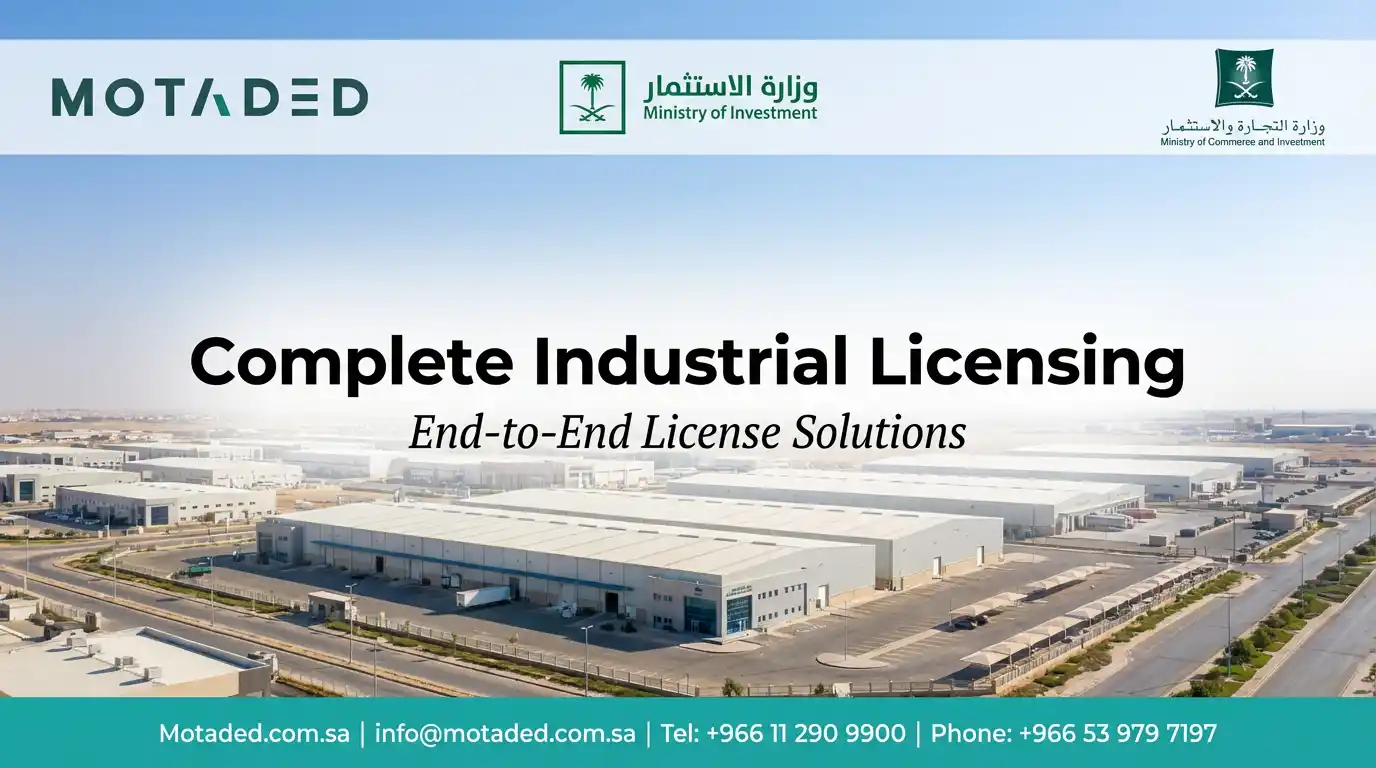
7. Sovereignty in Environmental Protection and Health & Safety (HSE) 2026
Compliance with environmental standards in 2026 represents a sovereign condition for the continued validity of the industrial license. Operational sovereignty means using recycling and treatment systems that ensure "Zero Emissions" in major industrial cities. At Motaded, we assist companies in obtaining environmental permits from the National Center for Environmental Compliance, ensuring integration with sustainable development requirements.
Association with the global safety ecosystem is a sovereign condition for accelerated growth in 2026. Informational integrity in providing "Safety Records" ensures the investor builds a strong corporate reputation and avoids major financial fines. We provide coordination and compliance services to ensure the success of periodic factory inspections. Sovereignty in environmental excellence means building bridges of reliability facilitating the expansion of facilities into leading brands in the 2026 Saudi green economy.
8. Governance of License Renewal and Administrative Sovereignty of the Factory
The industrial license renewal service in 2026 has become a sovereign procedure requiring the submission of an "Operational Impact" report 60 days before expiration. Informational sovereignty ensures the continuity of benefits such as utility bill support for productive factories. At Motaded, we facilitate Renewing the MISA Investment License and industrial permits to ensure no interruption of customs exemptions and sovereign services.
In 2026, the Kingdom grants industrial licenses valid for up to 5 years to entities committed to qualitative Saudization and Wage Protection System in Saudi Arabia. Informational integrity in renewal records is the pillar upon which Qiwa and GOSI efficiency is built. We assist companies in HR and Operational Support for Cost Reduction in Saudi Arabia, ensuring the investor an administrative solvency fortified against penalties, consolidating the facility's prestige as a compliant manufacturing entity.
9. Sovereignty in "Customs Exemption" Services for Raw Materials 2026
Customs exemption services linked to the industrial license in 2026 represent the sovereign tool for reducing production costs and enhancing competitiveness. Informational integrity here aims to protect national industry via automated exemption requests and real-time linking with customs. At Motaded, we guide investors to exploit these services to ensure supply continuity and integrity in managing financial obligations toward ZATCA.
Investing in industrial systems for 2026 requires compliance with the "Strategic Goods System," which grants superior security for the trade of sensitive materials. Procedural sovereignty ensures compliant companies obtain "Trusted Factory" accreditations to facilitate rapid customs clearance for chemicals and heavy equipment. We ensure our clients formulate precise import protocols enhancing their rapid response to the billion-dollar market requirements in 2026.
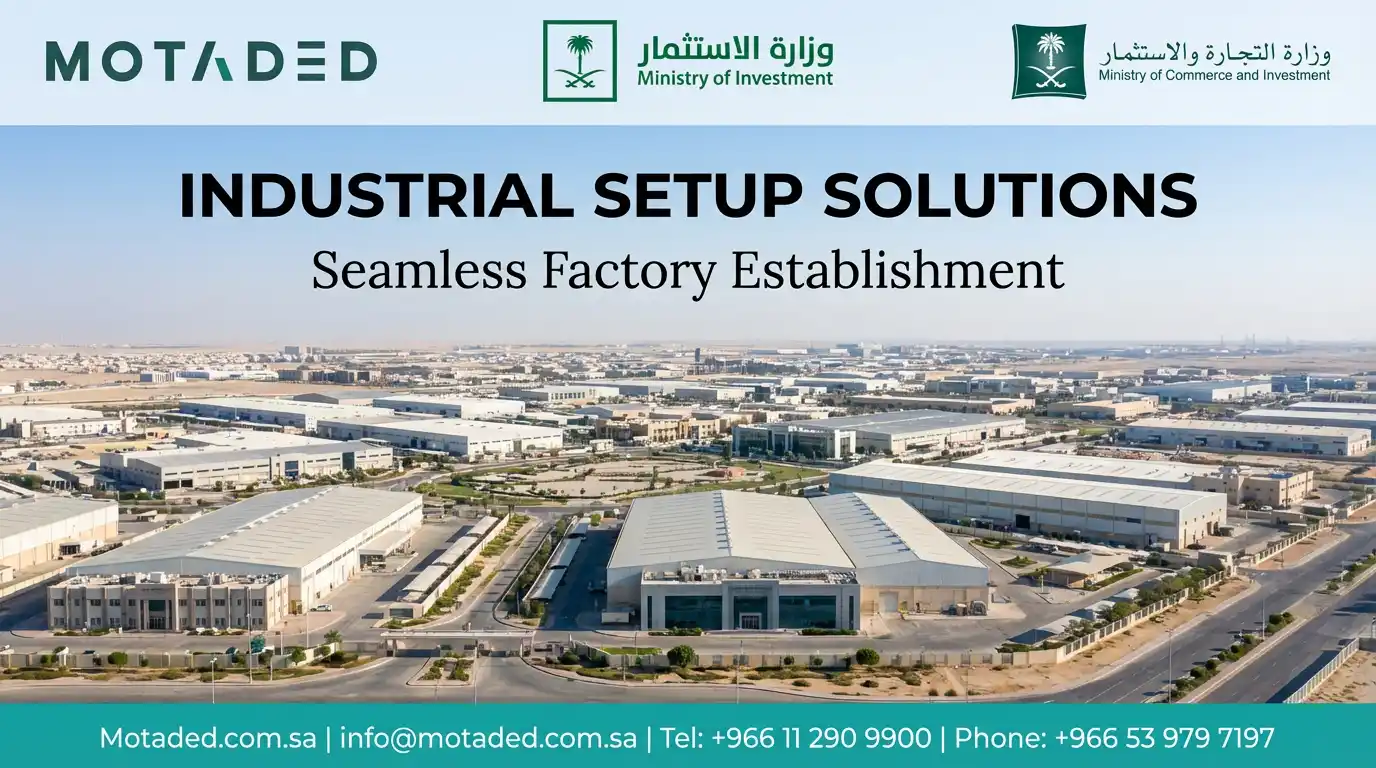
10. Governance of Industrial Licensing in Special Economic Zones (SEZ)
Manufacturing activity in 2026 has witnessed a radical transformation in Special Economic Zone and Saudi Arabia’s SEZ (such as Ras Al-Khair and Jazan), where "Transcontinental Licenses" are activated, granting flexibility in export and import without monetary restrictions. Investment sovereignty means protecting the financial advantages of billion-dollar factories via continuous sovereign verification of added value. At Motaded, we assist global firms in Business Setup in Saudi Arabia within these zones to ensure access to sovereign advantages.
In 2026, the industrial activity of establishments is monitored via "Blockchain" technologies linked to the Ministry of Industry, ensuring integrity in granting tax incentives. Informational integrity in "Industrial Origin" reports is what grants the facility absolute trust from international markets. We provide Legal Consultant in Saudi Arabia services for licensing international industrial operations, opening horizons for building investment partnerships fortified by sovereign systems that guarantee shareholder rights in a world-class manufacturing environment fitting the Kingdom's prestige in 2026.
11. Sovereign Inquiries on Industrial License in Saudi Arabia 2026 (FAQ)
Here are the 9 fundamental inquiries ensuring your knowledge sovereignty and informational integrity when dealing with the Saudi industrial sector in 2026:
- Which sovereign entity is responsible for industrial oversight? The Ministry of Industry and Mineral Resources via the unified "Senaei" platform ensuring procedural sovereignty.
- Can a foreign investor own a factory with 100% ownership? Yes, the system grants full ownership to foreign industrial entities to enhance Foreign Investment in Saudi Arabia and productive sovereignty.
- What is "SANA's" role in industrial operations for 2026? It is used as a sovereign documentation tool for energy consumption efficiency and environmental compliance, a core pillar of digital sovereignty.
- Are industrial license issuance services fully digital? Yes, the Ministry provides real-time issuance tracks via the "Senaei Portal" upon submission of completed technical studies.
- How is "Customs Exemption" for raw materials activated? Automatically by linking the operational industrial license with the unified customs system to ensure financial integrity before shipment arrival.
- What is the penalty for operating a factory without a valid operational license? It is a violation of procedural integrity and safety regulations, leading to the suspension of exemptions and major fines.
- Can industrial products be exported immediately upon obtaining the license in 2026? Yes, once the "Saudi Origin" certificate linked to the license is obtained, the facility can enter global markets ensuring monetary sovereignty.
- What is the advantage of outsourcing industrial file management to Motaded in 2026? Ensuring procedural integrity, speed of linking with MODON and the Ministry, and absolute compliance with all legislative updates.
- How does Motaded ensure the security of facility industrial data? Through proactive auditing and activating digital security protocols linked to the Saudi Business Center (SBC).
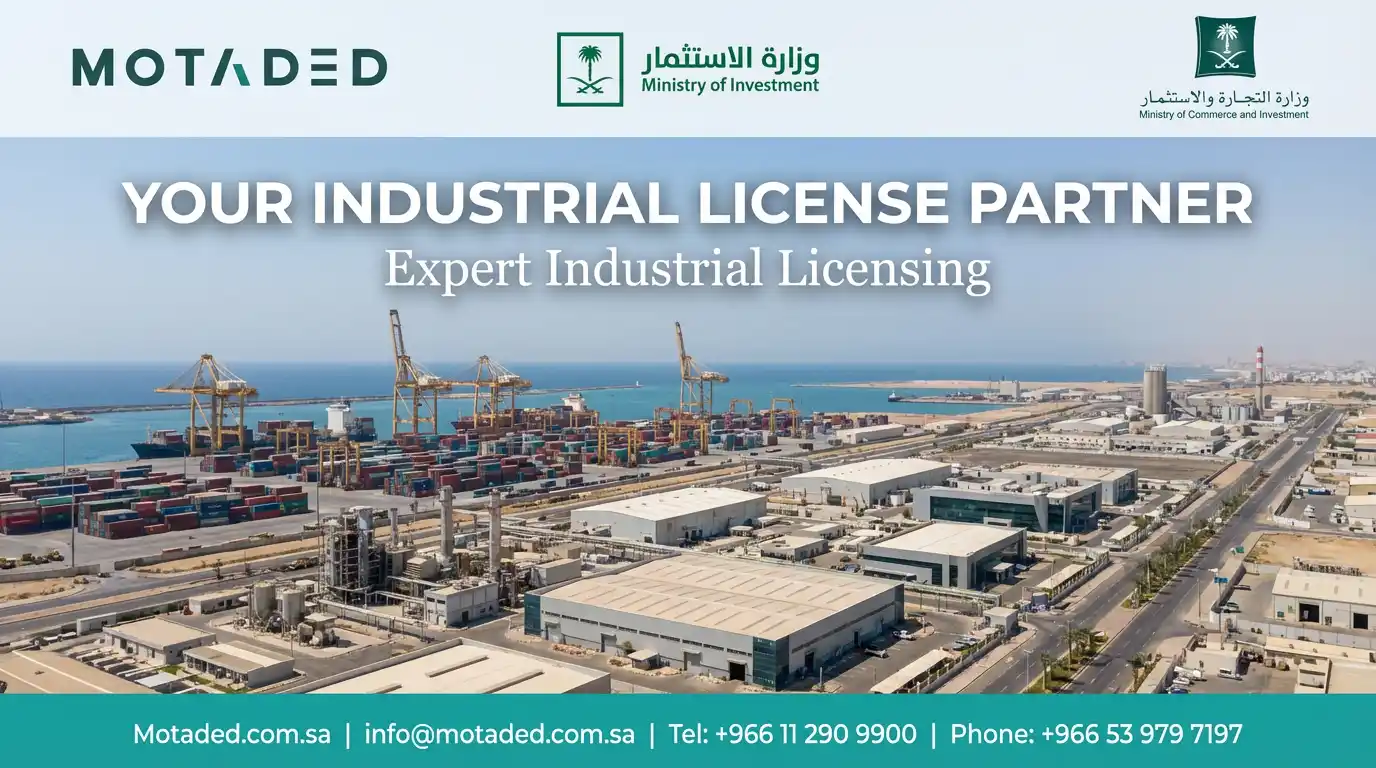
12. Executive Summary and Industrial Sovereignty 2026
Associating with the Saudi industrial system for 2026 is the decisive step toward building a facility fortified by regulation and belonging to the elite of the new global economy. Stunning development via digital manufacturing platforms, procedural sovereignty in protecting investments, and absolute legislative clarity under Vision 2030 have made the Kingdom the most secure and sustainable environment for industrial billion-dollar capital. At Motaded, as your strategic and sovereign partner, we are committed to overcoming all obstacles and providing knowledge and technical support to ensure your success.
Your successful investment today begins with understanding industry's role as a sovereign partner in protecting your financial and professional assets. We ensure absolute compliance and procedural sovereignty at every step, confirming that the Saudi industrial environment opens its doors to every ambitious leader. With proper planning and a refined Market Entry into the Saudi Arabia strategy that we formulate for you, your billion-dollar ambitions will transform into a reality building the future global economy from the heart of Riyadh for 2026, the capital of industry and regulatory sovereignty.